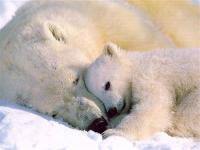Just as Bjorn Lomborg’s new book, Cool It, was being finished, the IPCC published its economic data making clear that he had badly overestimated the costs and the difficulties of controlling global warming. Their report convinced his old allies at The Economist magazine that the time had come to stop stalling and start making change, and that world would hardly notice the cost involved.
And earlier this month, just as his new book hit the bookstores, the U.S. Department of the Interior (that is to say the Bush administration, that is to say Interior Secretary Dirk Kempthorne, formerly the governor of Idaho, that is to say not the Sierra Club) issued a report on the future for polar bears. The report actually came from the US Geological Survey, those people who pound the brass markers into the tops of mountains that record their height–it’s hard to imagine a less political body. And their report report that flat out proves just how wrong he is.
Lomborg made polar bears the test case of his book–it’s where he starts his narrative trying to prove that environmentalists are alarmists. In fact, he says, only two of twenty polar bear populations are decreasing, and two are actually on the rise. Polar bears are the best example, he says, of “vastly exaggerated and emotional claims that are simply not supported by data.”
Except now they are. The Interior Department study, to quote the New York Times, found that “two-thirds of the world’s polar bears will disappear by 2050, even under moderate projections for shrinking summer sea ice caused by greenhouse gases in the atmosphere.” And those moderate projections are almost certainly wrong–on Monday, the Sea Ice Data Center reported that this year’s minimum sea ice extent broke the old record by almost 400,000 square miles, or about 20 percent. The latest figures, said one researcher, “had simply fallen off a cliff and we’re still losing ice.”
Subscribe to our newsletter
Stay up to date with DeSmog news and alerts







